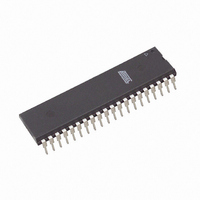ATMEGA8515-16PU Atmel, ATMEGA8515-16PU Datasheet - Page 5

ATMEGA8515-16PU
Manufacturer Part Number
ATMEGA8515-16PU
Description
IC AVR MCU 8K 16MHZ 5V 40DIP
Manufacturer
Atmel
Series
AVR® ATmegar
Specifications of ATMEGA8515-16PU
Core Processor
AVR
Core Size
8-Bit
Speed
16MHz
Connectivity
EBI/EMI, SPI, UART/USART
Peripherals
Brown-out Detect/Reset, POR, PWM, WDT
Number Of I /o
35
Program Memory Size
8KB (4K x 16)
Program Memory Type
FLASH
Eeprom Size
512 x 8
Ram Size
512 x 8
Voltage - Supply (vcc/vdd)
4.5 V ~ 5.5 V
Oscillator Type
Internal
Operating Temperature
-40°C ~ 85°C
Package / Case
40-DIP (0.600", 15.24mm)
Cpu Speed
16 MIPS
Eeprom Memory
512 Bytes
Input Output
35
Interface
SPI/USART
Memory Type
Flash
Number Of Bits
8
Package Type
40-pin PDIP
Programmable Memory
8K Bytes
Timers
1-8-bit, 1-16-bit
Voltage, Range
4.5-5.5 V
Processor Series
ATMEGA8x
Core
AVR8
Data Bus Width
8 bit
Data Ram Size
512 B
Interface Type
SPI, USART
Maximum Clock Frequency
16 MHz
Number Of Programmable I/os
35
Number Of Timers
2
Operating Supply Voltage
4.5 V to 5.5 V
Maximum Operating Temperature
+ 85 C
Mounting Style
Through Hole
3rd Party Development Tools
EWAVR, EWAVR-BL
Development Tools By Supplier
ATAVRDRAGON, ATSTK500, ATSTK600, ATAVRISP2, ATAVRONEKIT
Minimum Operating Temperature
- 40 C
For Use With
ATSTK600 - DEV KIT FOR AVR/AVR32770-1007 - ISP 4PORT ATMEL AVR MCU SPI/JTAGATAVRISP2 - PROGRAMMER AVR IN SYSTEMATSTK500 - PROGRAMMER AVR STARTER KIT
Lead Free Status / RoHS Status
Lead free / RoHS Compliant
Data Converters
-
Lead Free Status / Rohs Status
RoHS Compliant part
Electrostatic Device
Available stocks
Company
Part Number
Manufacturer
Quantity
Price
Part Number:
ATMEGA8515-16PU
Manufacturer:
AT
Quantity:
20 000
Pin Descriptions
VCC
GND
Port A (PA7..PA0)
Port B (PB7..PB0)
Port C (PC7..PC0)
Port D (PD7..PD0)
Port E(PE2..PE0)
RESET
XTAL1
XTAL2
2512JS–AVR–10/06
Digital supply voltage.
Ground.
Port A is an 8-bit bi-directional I/O port with internal pull-up resistors (selected for each
bit). The Port A output buffers have symmetrical drive characteristics with both high sink
and source capability. When pins PA0 to PA7 are used as inputs and are externally
pulled low, they will source current if the internal pull-up resistors are activated. The Port
A pins are tri-stated when a reset condition becomes active, even if the clock is not
running.
Port A also serves the functions of various special features of the ATmega8515 as listed
on page 67.
Port B is an 8-bit bi-directional I/O port with internal pull-up resistors (selected for each
bit). The Port B output buffers have symmetrical drive characteristics with both high sink
and source capability. As inputs, Port B pins that are externally pulled low will source
current if the pull-up resistors are activated. The Port B pins are tri-stated when a reset
condition becomes active, even if the clock is not running.
Port B also serves the functions of various special features of the ATmega8515 as listed
on page 67.
Port C is an 8-bit bi-directional I/O port with internal pull-up resistors (selected for each
bit). The Port C output buffers have symmetrical drive characteristics with both high sink
and source capability. As inputs, Port C pins that are externally pulled low will source
current if the pull-up resistors are activated. The Port C pins are tri-stated when a reset
condition becomes active, even if the clock is not running.
Port D is an 8-bit bi-directional I/O port with internal pull-up resistors (selected for each
bit). The Port D output buffers have symmetrical drive characteristics with both high sink
and source capability. As inputs, Port D pins that are externally pulled low will source
current if the pull-up resistors are activated. The Port D pins are tri-stated when a reset
condition becomes active, even if the clock is not running.
Port D also serves the functions of various special features of the ATmega8515 as listed
on page 72.
Port E is an 3-bit bi-directional I/O port with internal pull-up resistors (selected for each
bit). The Port E output buffers have symmetrical drive characteristics with both high sink
and source capability. As inputs, Port E pins that are externally pulled low will source
current if the pull-up resistors are activated. The Port E pins are tri-stated when a reset
condition becomes active, even if the clock is not running.
Port E also serves the functions of various special features of the ATmega8515 as listed
on page 74.
Reset input. A low level on this pin for longer than the minimum pulse length will gener-
ate a reset, even if the clock is not running. The minimum pulse length is given in Table
18 on page 46. Shorter pulses are not guaranteed to generate a reset.
Input to the inverting Oscillator amplifier and input to the internal clock operating circuit.
Output from the inverting Oscillator amplifier.
ATmega8515(L)
5



















